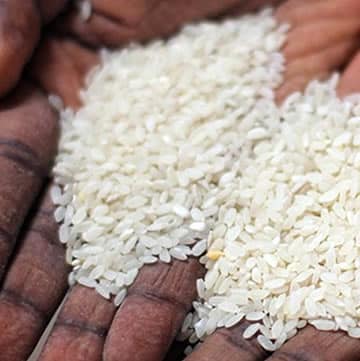Path
The Situation
Billions of people suffer from micronutrient malnutrition—a factor that substantially contributes to the global burden of disease. In particular, iron and zinc deficiencies affect the development of young children, increase maternal mortality, and dramatically reduce the productivity of entire populations. PATH’s Ultra Rice® technology is a cost-effective micronutrient delivery system that packs vitamins and minerals into rice-shaped grains made from a rice flour base.
With support from partners, PATH had prepared to implement a clinical field study to evaluate the effect of Ultra Rice® on moderately anemic schoolchildren in Burundi. This study was also designed to test the operational feasibility of manufacturing, storing, and distributing Ultra Rice® fortified grains in the challenging conditions present in many parts of Africa. Positive study results would allow Ultra Rice® to be eligible for inclusion on the U.S. Department of Agriculture’s list of approved commodities, a step that could significantly expand its availability throughout Africa and broaden its adoption within the World Food Programme’s school feeding programs.
The Roadblock
In order to conduct the study, PATH required ethical approval from an in-country national ethics committee which, unfortunately, did not exist at the time. The committee needed to be formed before approval could be given for PATH to continue its work. This left insufficient time in the school year to conduct a scientifically valid study within the scope of the original project. Without additional funds to extend the study to the following school year, the study could not take place.
Open Road's Response
A $75,000 grant from Open Road Impact enabled PATH to retain its research staff and replenish supplies, thereby allowing the project team to carry out the study during the following school year. With a full year of duration as originally designed, the field study provided scientifically valid data on the impact of regular consumption of fortified rice on moderately anemic schoolchildren.
Through this study, PATH generated valuable data not only on the health impact Ultra Rice® can have on malnourished and anemic children, but also on how external factors such as febrile illness (fever) can affect similar food-based interventions.
The operational data suggest that Ultra Rice® can be safely consumed for at least 24 months following production and that the shelf life can be extended to 24 months under similar storage conditions, thereby supporting its inclusion on the USDA food aid commodity list.
As a result of PATH’s research ethics requirement, the Burundian National Ethics Committee was formed. Burundi now has a standing ethics committee that is required to review and approve all research in the country.
To learn more visit: path.org

